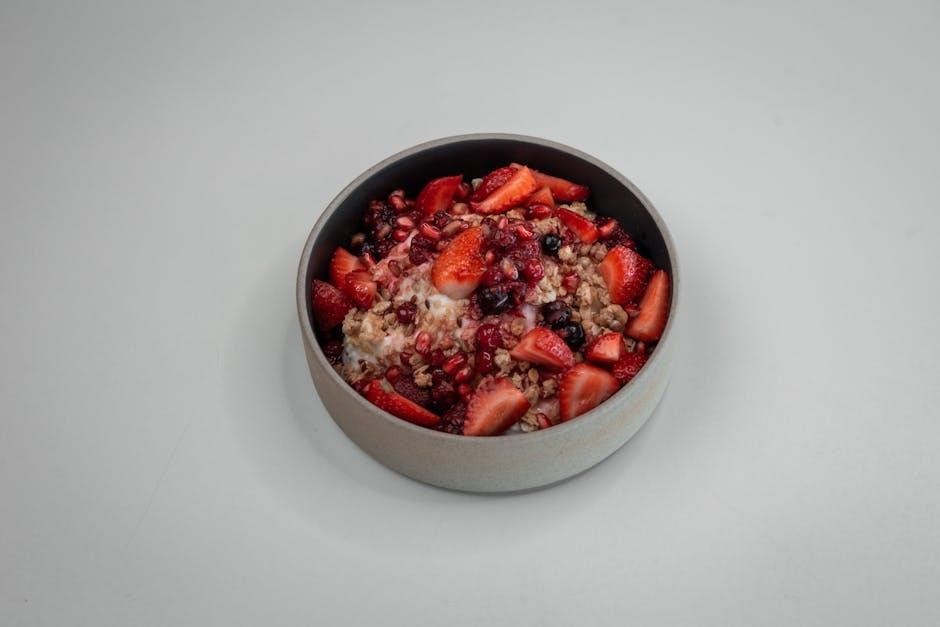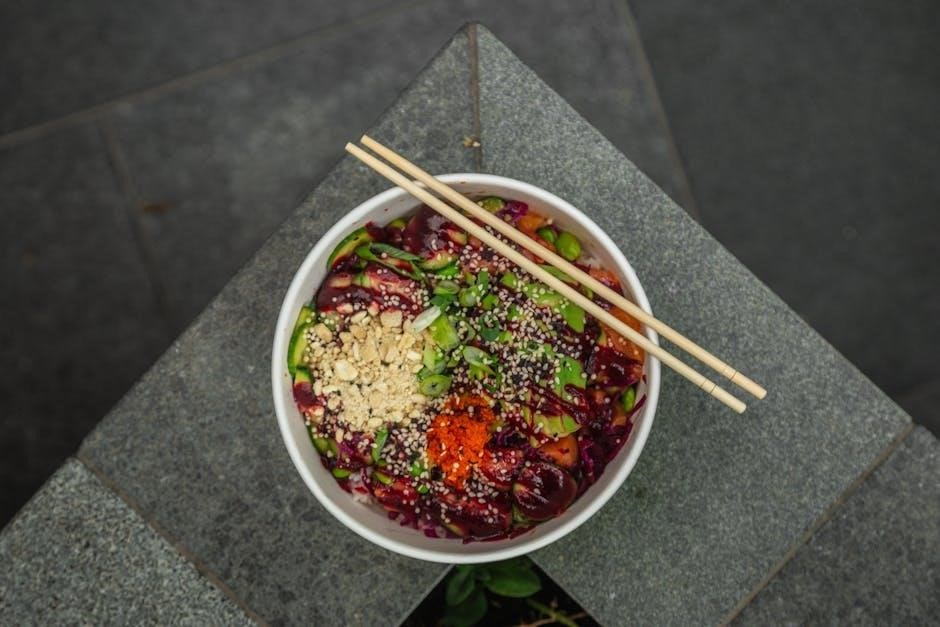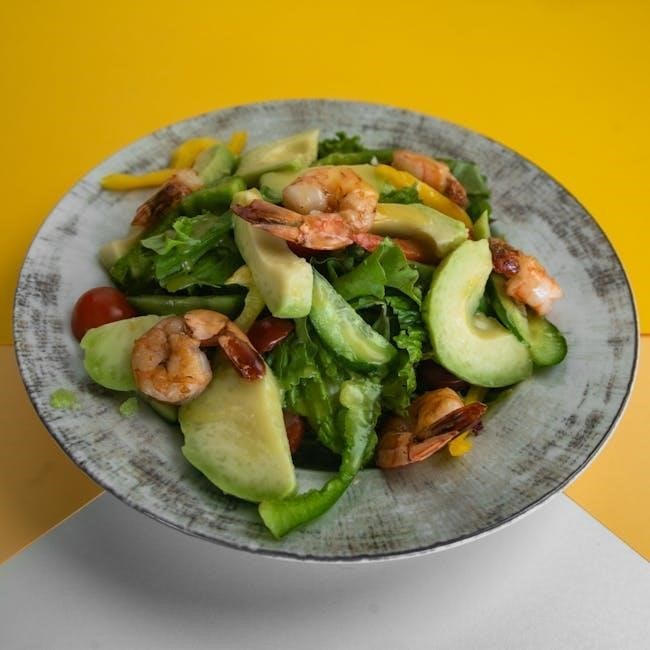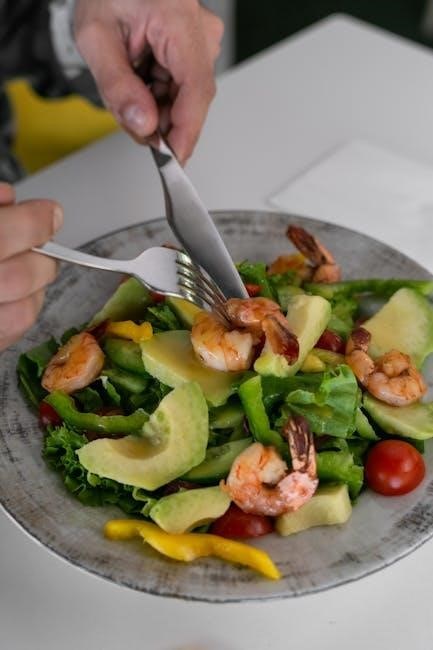The AIP diet is an elimination diet designed to reduce inflammation and manage autoimmune symptoms through a structured approach, focusing on nutrient-dense, whole foods․
What is the AIP Diet?
The Autoimmune Protocol (AIP) diet is a structured elimination diet designed to reduce inflammation and manage autoimmune conditions․ It focuses on removing inflammatory foods like grains, dairy, and nightshades while emphasizing nutrient-dense, whole foods such as grass-fed meats, wild-caught fish, and organic vegetables․ The diet aims to heal the gut, minimize immune system triggers, and improve symptoms associated with autoimmune diseases․ By eliminating potential irritants, the AIP diet helps identify specific food sensitivities and promotes long-term health through tailored dietary adjustments․ It is more restrictive than the Paleo diet but offers a clear framework for recovery․
History and Development of the AIP Diet
The AIP diet emerged as an extension of the Paleo diet, with roots in the work of Dr․ Loren Cordain․ It was further developed by Sarah Ballantyne, who refined the protocol to specifically address autoimmune conditions․ The diet gained popularity in the mid-2010s as a holistic approach to managing chronic illnesses․ By focusing on eliminating inflammatory triggers and promoting gut healing, the AIP diet has evolved into a widely recognized therapeutic tool, supported by online communities and scientific research․
Benefits of the AIP Diet
The AIP diet reduces inflammation, improves autoimmune symptoms, and promotes overall well-being by eliminating inflammatory triggers and focusing on nutrient-dense foods․
Reduction of Inflammation
The AIP diet is highly effective in reducing inflammation, a key contributor to autoimmune diseases․ By eliminating inflammatory foods like grains, dairy, and nightshades, the diet helps calm the immune system․ It focuses on nutrient-dense foods that promote healing and gut health, which are essential for lowering chronic inflammation․ This approach not only alleviates symptoms but also supports long-term health․ The diet’s emphasis on anti-inflammatory nutrients makes it a powerful tool for managing inflammation-related conditions․
Improvement in Autoimmune Symptoms
The AIP diet has shown significant promise in improving autoimmune symptoms by addressing the root causes of inflammation and immune dysfunction․ By removing trigger foods, the diet reduces immune system overload, leading to decreased symptom severity and frequency․ Many individuals report improvements in conditions like rheumatoid arthritis, lupus, and Crohn’s disease․ The diet’s focus on healing the gut and promoting nutrient absorption further supports immune balance, offering a holistic approach to managing autoimmune disorders and enhancing overall well-being․
A Step-by-Step Guide to Starting the AIP Diet

The AIP diet begins with an elimination phase, removing inflammatory foods like grains, dairy, and nightshades, followed by a gradual reintroduction to identify triggers․
The Elimination Phase
The elimination phase of the AIP diet involves removing all inflammatory foods, including grains, dairy, legumes, nightshades, nuts, eggs, and processed sugars, to reduce immune triggers and inflammation․ This phase typically lasts for several weeks to allow the body to heal․ During this time, focus on consuming nutrient-dense foods like grass-fed meats, wild-caught fish, organic vegetables, and fruits to support healing and reduce autoimmune symptoms effectively․
The Reintroduction Phase
The reintroduction phase involves gradually reintroducing eliminated foods one at a time to identify triggers․ After symptoms improve, each food is tested in small portions, typically every 3-5 days․ This phase helps determine which foods can be safely included in the long term․ It’s crucial to monitor reactions closely and maintain a focus on nutrient-dense choices to sustain health and minimize inflammation․ Patience is key to understanding personal tolerances and optimizing the diet for individual needs․

Foods to Eat on the AIP Diet
The AIP diet emphasizes nutrient-dense, whole foods, including grass-fed meats, wild-caught fish, organic vegetables, fruits, and some plant-based milks, focusing on anti-inflammatory and healing properties․
Nutrient-Dense Foods
The AIP diet prioritizes nutrient-dense foods, including grass-fed meats, wild-caught fish, and organic vegetables․ These foods are rich in vitamins, minerals, and antioxidants, which support healing and reduce inflammation․ Emphasis is placed on whole, unprocessed options like leafy greens, root vegetables, and fresh fruits․ Healthy fats, such as avocado and olive oil, are also encouraged․ The goal is to provide the body with essential nutrients while avoiding inflammatory triggers, promoting a balanced and restorative diet for autoimmune management․

Approved Food List
The AIP diet emphasizes whole, unprocessed foods․ Approved options include grass-fed meats, wild-caught fish, and pastured poultry․ Vegetables like leafy greens, broccoli, and carrots are encouraged, along with fruits such as berries and citrus․ Healthy fats like avocado, olive oil, and coconut oil are also permitted․ Certain herbs and spices, like garlic and turmeric, are allowed, as are bone broths and fermented foods․ This list focuses on nutrient-rich, anti-inflammatory choices to support healing and overall well-being on the AIP diet․

Foods to Avoid on the AIP Diet
- Grains, dairy, legumes, nightshades, nuts, and seeds․
- Eggs, processed sugars, alcohol, and certain oils․

Inflammatory Foods
The AIP diet identifies and eliminates foods that trigger inflammation, such as grains, nightshades, and certain proteins․ Grains contain lectins, which can irritate the gut, while nightshades like tomatoes and peppers have alkaloids that may worsen autoimmune symptoms․ Processed foods, refined sugars, and unhealthy oils are also avoided due to their pro-inflammatory effects․ By removing these triggers, the diet aims to reduce inflammation and promote healing in individuals with autoimmune conditions․
Processed and Refined Foods
Processed and refined foods are strictly avoided on the AIP diet due to their inflammatory effects․ These foods often contain harmful additives, artificial flavors, and refined sugars that can disrupt gut health and trigger autoimmune responses․ Examples include packaged snacks, sugary beverages, and foods with artificial preservatives․ Refined oils, such as seed oils, are also eliminated because they are highly inflammatory․ The diet emphasizes whole, unprocessed foods to promote healing and reduce inflammation․

Meal Planning and Recipes
Meal planning on the AIP diet involves creative, nutrient-dense recipes that avoid inflammatory foods․ Focus on whole, anti-inflammatory ingredients to create delicious, healing meals and snacks․
Breakfast Ideas
Start your day with nutrient-dense AIP-friendly breakfasts! Try skillet dishes with grass-fed meats, fresh veggies, and herbs․ Enjoy smoothies made with organic fruits, greens, and AIP-compliant non-dairy milks․ Zucchini boats stuffed with ground meat or fish are a tasty option․ For a quick meal, opt for avocado with smoked salmon or a simple meat and veggie hash․ Don’t forget muffins made from AIP-friendly flours like tiger nut or cassava flour․ Meal prep can make mornings easier and delicious!

Lunch and Dinner Recipes
Elevate your AIP meals with creative, flavorful recipes! Try grilled meats paired with roasted veggies like Brussels sprouts or sweet potatoes․ Fish dishes, such as salmon with cauliflower rice, are both nutritious and tasty․ Opt for stuffed vegetables, like zucchini or bell peppers, filled with ground meat and spices․ Add variety with meatballs or skillet meals featuring leafy greens and root vegetables․ These recipes are designed to be simple, satisfying, and AIP-compliant, ensuring a balanced and enjoyable meal plan․
Snacks and Desserts
Enjoy delicious AIP-compliant snacks and desserts without compromising your health․ Opt for fresh fruit like berries or apples, paired with a handful of AIP-friendly nuts or seeds․ Try veggie sticks with cauliflower hummus or coconut milk-based dips․ For desserts, consider fruit salads or coconut cream treats sweetened with natural options․ Baked goods made from cassava flour or tiger nut flour are great alternatives․ These snacks and desserts are easy to prepare, nutrient-dense, and perfect for satisfying cravings while staying on track with the AIP diet․
Success Stories and Testimonials
Many individuals with autoimmune conditions report significant symptom reduction and improved quality of life after adopting the AIP diet․ Testimonials highlight its transformative impact on health and well-being․
Personal Experiences with the AIP Diet
Individuals with autoimmune conditions often share inspiring stories of symptom reduction and improved quality of life after adopting the AIP diet․ Many report decreased inflammation, better digestion, and increased energy levels․ Personal journeys highlight how the diet has transformed lives, enabling people to manage chronic illnesses more effectively․ These experiences underscore the diet’s potential to restore health and well-being when strictly followed and tailored to individual needs․
Case Studies

Case studies highlight the AIP diet’s effectiveness in managing autoimmune conditions like lupus, IBD, and rheumatoid arthritis․ Many individuals report significant symptom improvement, including reduced inflammation, enhanced digestion, and increased energy levels․ These studies demonstrate how the diet’s focus on nutrient-dense foods and elimination of triggers can lead to lasting health improvements, providing evidence-based support for its therapeutic benefits in addressing chronic autoimmune disorders․ The results underscore the diet’s potential as a sustainable, long-term solution for managing complex health challenges․
The AIP diet offers a structured approach to managing autoimmune conditions, emphasizing nutrient-dense foods and eliminating triggers to improve symptoms and quality of life effectively․
Final Thoughts on the AIP Diet
The AIP diet is a transformative approach for managing autoimmune conditions by eliminating inflammatory triggers and focusing on nutrient-dense foods․ While it requires commitment and patience, many find significant symptom improvement․ Incorporating whole foods like grass-fed meats, wild-caught fish, and organic vegetables can lead to reduced inflammation and enhanced well-being․ Regularly consulting resources like an AIP diet PDF guide can provide structured support and recipes, aiding individuals in their journey toward healthier living and better disease management․
Encouragement to Try the AIP Diet
Embracing the AIP diet can be a life-changing decision for those with autoimmune conditions․ By focusing on nutrient-dense foods and eliminating inflammatory triggers, individuals often experience significant improvements in symptoms and overall health․ With structured guides like an AIP diet PDF, transitioning to this lifestyle becomes more manageable․ The diet’s emphasis on whole, anti-inflammatory foods can lead to enhanced well-being and long-term health benefits, making it a worthwhile journey for those seeking to manage autoimmune challenges effectively․



